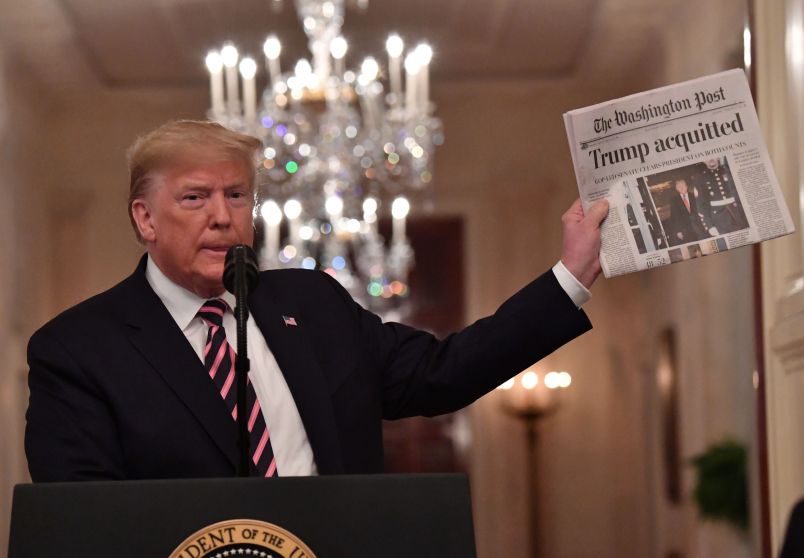President Trump accused the jury foreperson in the trial of GOP provocateur Roger Stone of “bias” on Thursday, a claim that shows the President’s willingness to intervene in the judicial system on behalf of a political ally and friend.
But the claim also lacks founding in reality, and ignores the numerous chances that Stone and his defense attorneys had to examine all potential jurors in the case.
Besides attacking the independence of the judiciary and, in the words of one former DOJ official, potentially “chilling” future jurors, Trump’s claim exists in an alternate universe: one in which Stone and his lawyers were deprived of the opportunity to interview and suss out the backgrounds of the members of the jury that were selected to judge him.
Trump made the accusation in a tweet, apparently inspired by articles in the right-wing media suggesting that the jury foreperson’s earlier decision to run for office as a Democrat discredited the jury.
“What he is doing is attempting to intervene directly in a pending criminal case involving a political ally,” retired federal judge Nancy Gertner, now a lecturer at Harvard Law School, told TPM. “This is what banana republics do.”
The Jurors Were All Interviewed
Multiple attorneys who have practiced federal criminal law for years in various parts of the justice system emphasized to TPM that the jury selection process for a federal trial is explicitly designed to eliminate the complaint at the heart of President Trump’s accusation: bias that would prevent a juror from fairly weighing the facts and law of a case.
Defense attorneys and prosecutors submit questions to the judge, who creates a questionnaire for jurors designed to suss out aspects of their background, information diet, and views related to the case at hand.
“The whole process is designed to flag potential bias,” Timothy Heaphy, a former U.S. Attorney who is now general counsel for the University of Virginia, told TPM.
This occurred in the Stone case. Defense attorneys were also granted peremptory strikes, which allows jurors to be stricken for any permissible reason.
The Juror In Question Revealed Relevant Information
Mark W. Bennett, a former Iowa federal judge, told TPM that there was one way that Stone and his allies could raise relevant issues about the jury post-trial: if information showing that the juror initially gave false or incomplete information emerged.
“The only way it could be a problem post-trial would be if they asked a question and the jury foreperson provided an inaccurate, incomplete, or incorrect answer,” said Bennett, the former federal judge.
No evidence has been publicly brought forth to suggest that that was the case with respect to the juror that Trump referenced.
In fact, the Washington Post reported on Thursday that the juror disclosed her political affiliation and past involvement with Democratic political campaigns during the selection process, as required.
Gertner, another former federal judge, examined the questionnaires used in the Stone trial.
“It’s critical that she disclosed,” Gertner said, emphasizing that there could only be any further issue if what the foreperson initially said was somehow incomplete.
Stone Got A Fair Shot At Examining Them
Trump and his allies’ claim that the foreperson suffered from bias also mistakes a key pillar of the jury system: it accepts that people enter the process with independent backgrounds and political views.
The process, rather, is designed to remove those who cannot fairly judge evidence and make decisions on the law before them.
In the Stone case, his defense attorneys reportedly interviewed several of the jurors during selection, and submitted interrogatories for the jury questionnaire.
“They should have had ample opportunity to ferret out any bias and remove a juror,” said Bennett.
His attorneys could have appealed any ruling made by the judge at that stage of the case, but there’s no evidence that they did so. Once the jury pool was finalized, that was Stone’s last opportunity to contest issues like the composition of those set to judge him.
The question now is less Stone’s fate and more what affect a week of pressure on both the prosecutorial and judicial branches of government will have on the criminal justice system.
“As a longtime federal prosecutor, I’m shocked and really disappointed in the White House being involved in any specific criminal case,” said Heaphy, the former U.S. attorney.
“This is going to chill people from wanting to serve on juries,” he added. “It’s going to chill the exercise of the law by line federal prosecutors.”
Gertner, the former federal judge, added that it ran the risk of turning prosecutors “from professionals into political lackeys.”
“It’s making everyone from one end of the country to the other who are working for the DOJ decide if they can continue in their jobs as independent professionals,” she added.










